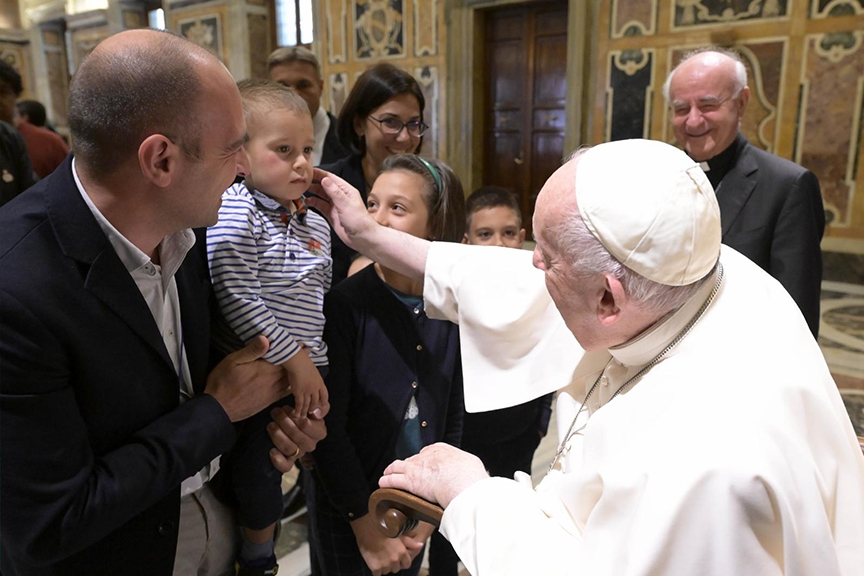
VATICAN CITY. The importance of the family for the Catholic Church and for society means that theological reflection on family life and pastoral responses to the joys and problems of families must focus on more than the relationship between a husband and wife, Pope Francis said.
“Theology itself is called to elaborate a Christian vision of parenthood, filiality, fraternity – therefore, not only of the conjugal bond – that corresponds to the family experience within the horizon of the entire human community,” the pope told staff and students of the Pontifical John Paul II Theological Institute for the Sciences of Marriage and Family.
The audience Oct. 24 marked the fifth anniversary of Pope Francis’ refoundation of the institute established by St. John Paul II in 1982 after the 1980 Synod of Bishops on the family called for the creation of centers devoted to the study of the Church’s teaching on marriage and family life.
The expansion of the institute’s focus was criticized by some groups as lessening a focus on traditional Catholic teaching about the sacrament of marriage and marital relations.
Pope Francis acknowledged those criticisms at the audience but said, “it would be gravely mistaken” for anyone to read the institute’s expanded focus “in terms of opposition to the mission it received with its original institution.”
“In reality,” he said, “the seed is growing and generating flowers and fruit. If a seed does not grow, it stays there like a piece in the museum, but it does not grow.”
As a pontifical institute, he said, the center is called to help the whole Church look “without naïveté” at the transformations taking place in people’s understanding about “the relationships between man and woman, between love and generation, between family and community.”
“The mission of the Church today urgently calls for the integration of the theology of the marital bond with a more concrete theology of the condition of the family,” he said. “The unprecedented turbulence, which is testing all family bonds at this time, calls for careful discernment to note the signs of God’s wisdom and mercy.”
“We are not prophets of doom, but of hope,” Pope Francis insisted. So, even when looking at crises impacting families, the Church also must see and share “the consoling, often moving signs of the capacities family ties continue to show on behalf of the faith community, civil society and human coexistence. We have all seen how valuable, in times of vulnerability and duress, the tenacity, the resilience and the cooperation of family ties are.”
No one benefits from an attitude that says the Church will encourage and care for the vocations only of perfect families, the pope said, because “marriage and family life will always have imperfections until we are in heaven.”
Pope Francis warned the students and staff to “be careful of ideologies that meddle to explain the family from an ideological point of view. The family is not an ideology, it is a reality.”
To understand and assist “a family that has this grace of a man and a woman who love each other and create, and to understand the family, we always must go to the concrete, not ideologies. Ideologies ruin, ideologies meddle to make a path of destruction. Be careful of ideologies!”









